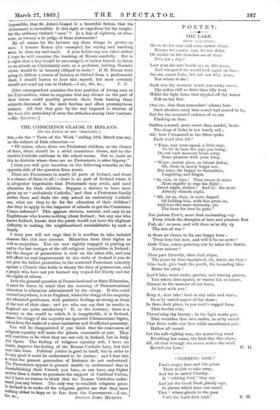THE CONSCIENCE CLAUSE IN IRELAND.
[TO THE EDITOR OF THE "SPECTATOR?')
Si,—In the "News of the Week " ending 13th March you say, on the subject of Irish education :—
" Of course, where there are Protestant children, or the chance of them, there should be a strict conscience clause, and no distinctive Catholic emblems in the school-rooms. But to insist on this in districts where there are no Protestants is utter bigotry."
I trust you will give insertion to the following remarks on the opposite side of the question from yours.
There are Protestants in nearly all parts of Ireland, and there is a chance of them in all ; —there is no part of Ireland where it is altogether improbable that Protestants may settle, and need education for their children. Suppose a district to have been given up as "exclusively Catholic," and that a Protestant family settles there and finds the only school an exclusively Catholic one, what are they to do for the education of their children? Are they to apply to the inspector of schools to get the Conscience Clause enforced ? This appears obvious, natural, and easy to an Englishman who knows nothing about Ireland ; but any one who knows Ireland, knows that the priest would not have the slightest difficulty in making the neighbourhood uninhabitable by such a family.
I trust you will not urge that it is needless to take isolated chances like this into account. Minorities have their rights as well as majorities. You are now rightly engaged in putting an end to the last vestiges of the old religious inequalities in Ireland ; but the danger of persecution is now on the other side, and you will effect no real improvement in the state of Ireland if you do not give the fullest protection to the scattered Protestant minority against a Church that holds in theory the duty of persecution, and a people who have not yet learned any respect for liberty and for the rights of others.
As to the general question of Denominational or State Education, must be borne in mind that the meaning of Denominational education is education administered by the clergy. If this could succeed anywhere, it is in England, where the clergy of the majority are educated gentlemen, with patriotic feelings as strong as those of the rest of their class ; and yet who can say that its results in England are quite satisfactory ? If, on the contrary, there is a country in the world to which it is inapplicable, it is Ireland, where the clergy of the majority are ignorant Ultramontane bigots, taken from the ranks of a semi-barbarous and disaffected peasantry. You will be disappointed if you think that the concession of religious equality will make the priests reasonable or just. They will continue to be what they are not only in Ireland, but in Italy and Spain. The feeling of religious equality will, I have no doubt, improve the feeling of the Roman Catholic laity, but this may take time. Political justice is good in itself, but in order to do any good it must be understood to be justice ; and I fear this is what the present generation of Irishmen do not understand. The Protestants appear in general unable to understand that in disestablishing their Church you have, or can have, any higher motive than a desire to purchase the support of Cardinal Cullen, and I have no reason to think that the Roman Catholics understand you any better. The only way to establish religious peace Ill Ireland is to make all the religions parties see that they have
nothing either to hope or to fear from the Government.—I am, Sir, &C.,
JOSEPH Jonx MURPHY.


































 Previous page
Previous page